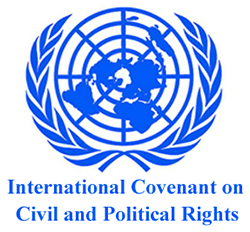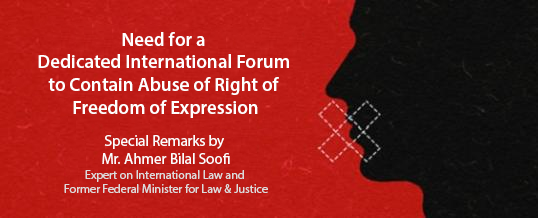|
I would like to bring formally on record my appreciation for the exercise which the think tank MUSLIM Institute is carrying out in highly professional manner. Speakers before me have given a rundown of the extensive nature of the academic work that this think tank is undertaking; I must congratulate all those who are associated with this exercise to make it a very meaningful and very thorough debate. I would also like to appreciate them in terms of the topics being touched.
Something which is not well noticed is that mostly people carry out a uni-dimensional exercise or debate but the manner in which this debate has been structured and presented i.e. the proposition has been framed and the debate has ensured the diverse views have been taken on board, is what, I think, is rewarding experience. One can hear people on this side of the fence opposing those who are on the other side of the fence and coming out with legal and rational argument building up greater clarity on the issue.
 |
The issue on the hand is of course extremely sensitive whether the freedom of expression gives one the right to insult others. I think the starting point was briefly mentioned from legal point of view is the three articles 18, 19 and 20 of International Covenant on Civil and Political Rights (ICCPR). These are those articles which create, ensure and grant the right of freedom of expression but at the same time also carve out certain exception zones. The articles say very specifically that advocacy of war is prohibited; therefore, freedom of expression will not include the advocacy of war. The freedom of expression will not enable any entity, whether a country or a non-state actor, to propagate war or to create justifications for war. So that is outrightly prohibited in the ICCPR. Thus the international convention, to which Pakistan is a party, has prohibited any kind of propaganda that advocates war. The other area where there is a prohibition is the incitement to violence; no person is permitted to carry out an exercise or expression which creates an incitement to generate violence. If there is an incitement to violence through a speech, through a television program, by a state or a non-state actor, they can be categorized in prohibitory zone in terms of international law and also in terms of Pakistan’s constitution which mirror images substantially those exceptions which are provided for in the international conventions. One can create domestic frameworks whether it is PEMRA (Pakistan Electronic Media Regularity Authority) framework, whether it is framework for licensing regimes created by PEMRA or some entities or whether it is any other nonbinding legal framework that institution may create which can implement these prohibitions.
 |
The other area which further mirror images that freedom of speech has inherent limitations is the official secrets act framework where when one takes oath under the constitution, the office bearer has a duty not to make disclosures. The official secret act’s legal framework creates another prohibitory zone in respect to which one needs not to share information in media and public. These are the areas which are least controversial. On incitement we have a UN Security Council resolution under chapter seven which binds the states that if freedom of expression is being misused to create incitement, one can stop that. The other remaining area now is the area which is the subject matter of this particular debate i.e. ‘the dignity of a human being’. To what extent the freedom of expression can indulge or interfere in the area of dignity? The law of dignity is personified in domestic jurisdiction through law of libel, the law of defamation. One cannot defame an individual; one cannot defame and create libel list comment against other. He will retain the right to react, to file a suit for defamation against the one who is defaming. He will have right to claim damages that one has wrongly defamed him. We have a specialized defamation law and a specialized defamation court on this and this is not only peculiar to Pakistan, the law of defamation is well developed in advanced jurisdictions e.g. in UK, US and elsewhere people file billions of dollars as suits. So the law relating to dignity of ordinary human being is well regarded, well respected and well recognized.
 |
When we talk of the laws relating to dignity of religious symbols, religious personality and religious beliefs, we are now talking of a different level altogether and that is why the debate brings so much of richness to this discussion. Few questions in this regard are; should the religions be defamed? Should the freedom of expression include the right to defame a religion or a religious symbol or religious personality, not particularly Muslim but of any religion? What is international law on it? What is domestic law on this? The international law on this is reflected in articles 18, 19 and 20 of ICCPR. Since 1960, there are over seventy plus UN General Assembly resolutions on defamation of religion. Thus the law relating to defaming of religion has been very well developed. Therefore the argument internationally is that there is international customs evolution, that one can actually identify in the UN General Assembly resolution set. There are various sets of resolutions especially on topic of defamation of religion. Then there are specialized resolutions of UN Human Rights Council in Geneva. For last several years, it has been passing a set of resolutions. These resolutions are also creating a legal prohibition with respect that we should not arbitrarily defame religious symbols. Then the UN Human Rights Council in recent process has passed a most specific resolution called 16/18 creating a legal framework and this has been sponsored by the OIC.
 |
The OIC has been very active and Pakistani delegation in Geneva Mr. Zameer Akram has been spearheading this process in which 16/18 has been formulated. In a more recent event, two weeks ago, I was in Jeddah myself, the Sectary General of OIC had summoned special experts session and international lawyers all over the Muslim community were summoned along with international experts, along with UN Human Right Council’s president, along with special rapporteur on freedom of expression and we had a two day long debate more or less on these issues identifying that there are limits that need to be respected and these limits are then also reflected in domestic laws of the countries. We shared with each other the domestic laws in Denmark, Germany, France and in several others countries in which it is very clearly identified that individuals, entities and groups could be prosecuted if they were found to be defaming a certain religion or a religious symbol. So this has been a practice of states at various levels. That has been a state practice of international law by the international community and given the state practice, this debate, which this think tank is carrying out, adds additional richness to that strength, to that formulation that we have been working on at international level.
There is a need, I believe that present Government and some of his leadership have been hinting towards it, a possibility of creating an international forum, a possibility of creating a legal framework, pursuant to which be those who have grievances, instead of resorting to violence, they should go to international venues, forums and say well Charlie Hebdo or some other newspaper or some entity has carried out an activity that defames us, it hurts our interests, our feelings and we want to know why this has been done and why shouldn’t a prosecution be done in this case. Let the defendant come and say well sorry I even didn’t realized I was hurting the feelings or that there was a such forum. We are at a maturity level based on the discussion that this debate has generated to come to a point where the Prime Minister of Pakistan or the government or the OIC should look at the possibility of a global venue for addressing some of these concerns that Muslim community as well as other communities across the world have. If ‘X’ community have grievance against ‘Y’ community, they should be equally entitled to use that forum. That forum will provide a comprehensive neutral platform to avoid violence because if we have a religious defamation incidence and that incidence leads to an act of aggression and violence, that further degenerates the whole process. Therefore I believe there is the time to look at these options.
I thank the participants and the organizers for giving me this opportunity. Thank you very much.
|

